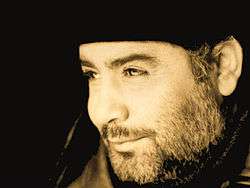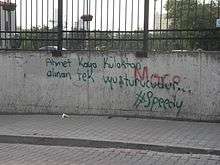Ahmet Kaya
| Ahmet Kaya | |
|---|---|
 | |
| Background information | |
| Born |
28 October 1957[1] Malatya, Turkey |
| Died |
16 November 2000 (aged 43) Paris, France |
| Genres | Turkish music, Kurdish music, Azerbaijani music |
| Occupation(s) | Musician, poet |
| Instruments | Bağlama, Singing |
| Years active | 1985–2000 |
| Website | www.ahmetkaya.com |

Ahmet Kaya (28 October 1957[1] – 16 November 2000) was a folk singer from Malatya, Turkey. He was of Kurdish origin and often identified himself as a "Kurd of Turkey".[2] Many of his albums broke sales records. Kaya, with over 20 albums, is by far one of the most influential and controversial artists of the 20th century in Turkey who was very vocal on social and political issues; had to flee Turkey for France and died in exile. An elegy "Ya beni sararsa memleket hasreti / What if I am homesick" tells the story of his agony, suffering, longing for the people and homeland he was torn away from. Many believe this led to his sudden death at a very young age. Ahmet Kaya paid a huge price announcing his wish "to sing in the Kurdish language" when he was invited to stage to receive award at an award ceremony live on TV in 1999. He was declared a villain by authorities; targeted with fabricated news as a "traitor" by newspapers and TV stations nationwide. Turkish Media portrayed Kaya as "Part of the Kurdistan Worker's Party and "with Abdullah Ocalan" as a result of his declaration of him being Kurdish.
Career
Ahmet Kaya was the fifth and last child born to his father, a Kurd who had moved from Adıyaman to Malatya. He first encountered music at the age of six. Ahmet Kaya worked for a while as a taxicab driver in Istanbul before becoming a famous singer in the mid-1980s.
His first album, Ağlama Bebeğim, was released in 1985. His popularity continued to rise into the 1990s when in 1994 he released the album Şarkılarım Dağlara which sold a record copies. All of his 1990 albums became chart-toppers.
During his career he recorded approximately 20 albums and was known for his protest music and positions on social justice. Recurring themes in his songs are love towards one's mother, sacrifice, and hope.
Awards ceremony incident
On 10 February 1999 during the televised annual music awards ceremony, Show TV, at which he was to be named Musician of the Year, Kaya said that he wanted to produce music in his native language, as he was of Kurdish background. He also announced that he had recorded a song in Kurdish (Karwan, released on the Hoşçakalın Gözüm album in 2001) and intended to produce a video to accompany it.
Following this announcement, he faced massive opposition from Turkish people and celebrities in the event. First, Serdar Ortaç started singing a song with modified lyrics to boost nationalist feelings,[3] then people in the ceremony started singing 10th Year March. Later, Kaya was attacked by celebrities. Kaya's wife describes the attack as "All of a sudden, all of those chic women and men, they all turned into monsters, grabbing forks and knives and throwing them at us, insulting, booing. Imagine the atmosphere changing in just five minutes, almost a Kafkaesque transformation."[4]
Exile and death
The incident led to a prosecution case which made him leave Turkey.[5] Kaya went to France in June 1999, escaping various charges arising from his political views.. In March 2000 he was sentenced in absentia to three years and nine months in prison on the charge of spreading separatist propaganda.[6] Later, however, the mass media allegation showing Kaya in front of the poster was proven to be forged.[7][8] He died from a heart attack in Paris in 2000,[9] at the age of 43, and is buried in Père Lachaise Cemetery.
Many believe that because of longing to his country he had health problems and therefore had a heart attack.[10]
Discography
- Ağlama Bebeğim (1985)
- Acılara Tutunmak (1985)
- Şafak Türküsü (1986)
- An Gelir (1986)
- Yorgun Demokrat (1987)
- Başkaldırıyorum (1988)
- Resitaller-1 (1989)
- İyimser Bir Gül - Kod Adı Bahtiyar (1989)
- Resitaller-2 (1990)
- Sevgi Duvarı (1990)
- Başım Belada (1991)
- Dokunma Yanarsın (1992)
- Tedirgin (1993)
- Şarkılarım Dağlara (1994)
- Beni Bul (1995)
- Yıldızlar ve Yakamoz (1996)
- Dosta Düşmana Karşı (1998)
Posthumous:
- Hoşçakalın Gözüm (2001)
- Biraz da Sen Ağla (2003)
- Kalsın Benim Davam (2005)
- Gözlerim Bin Yaşında (2006)
- Babaero Ahmet Kaya Yanlizim (2012)
Posthumous awards
In June 2012 the Turkish Association of Magazine Journalists awarded Ahmet Kaya its Special Prize.[11]
In October 2013 Ahmet Kaya was given the Grand Presidential Prize in Culture and Arts in the music category on the day that would have been his 57th birthday.[12]
References
- 1 2 Biography of Ahmet Kaya Archived 14 September 2008 at the Wayback Machine. Ahmet Kaya Resmi Web Sitesi
- ↑ "Kurdish singer Ahmet Kaya's widow still at odds with Turkey - LOCAL". Retrieved 1 February 2017.
- ↑ "O gece neler yaşandı".
- ↑ Kasapoglu, Cagil (11 November 2016). "Kurdish Singer Ahmet Kaya". bbc.co.uk. BBC. Retrieved 11 November 2016.
- ↑ "Kurdish Herald - The Independent and Resourceful Gateway to Kurdish News and Analyses". Retrieved 1 February 2017.
- ↑ "45 ay hapis". Hürriyet (in Turkish). 11 March 2000. Retrieved 23 April 2014.
- ↑ Haber7. "Ahmet Kaya'nın 6. ölüm yıldönümü". Retrieved 1 February 2017.
- ↑ "(in Turkish) Ahmet Kaya Cinayeti neden yayınlanmadı? 21 Şubat 2010, URL erişim tarihi: 31 Agustos 2010". Archived from the original on 11 March 2012. Retrieved 1 February 2017.
- ↑ Costas M. Constantinou, Cultures and Politics of Global Communication, Cambridge University Press, 2008, ISBN 978-0-521-72711-2, p. 188.
- ↑ "Hürriyet Daily News". Hürriyet Daily News.
- ↑ Müjgan Halis (18 June 2012). "Ahmet Kaya'dan özür dileyecekler!". Sabah (in Turkish). Archived from the original on 29 October 2013. Retrieved 23 April 2014.
- ↑ Aydın Hasan (29 October 2013). "Köşk'ün ödülü Ahmet Kaya'ya". Milliyet (in Turkish). Retrieved 23 April 2014.
External links
Further reading
- Ferzende, Kaya. Başım Belada. TR: Gam. ISBN 975-6628-19-7.
- Official Biography of Ahmet Kaya in English